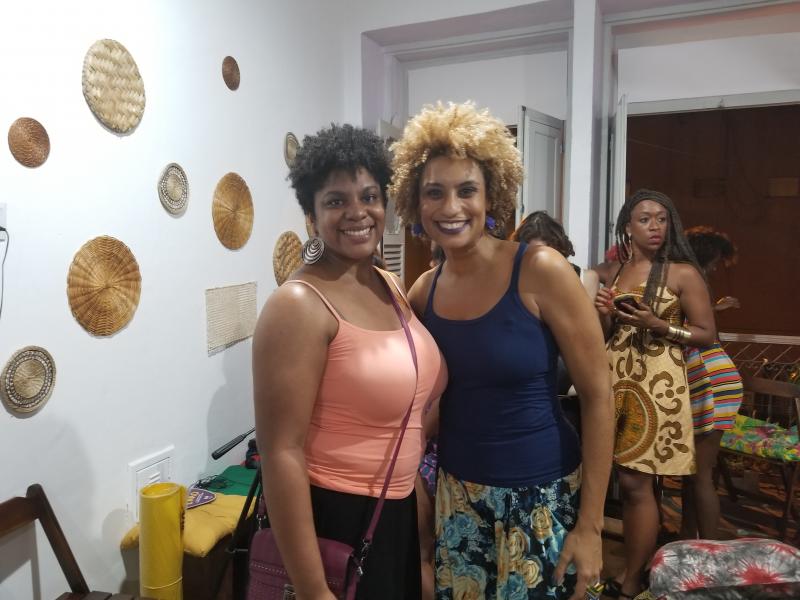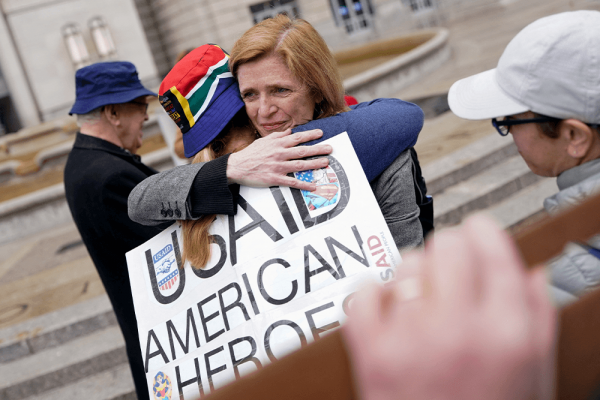“I am not free while any woman is a prisoner, even when her shackles are very different from my own." —final public words of Marielle Franco at Casa das Pretas, March 14, 2018
Some experiences change your life forever.
At the suggestion of a dear friend, colleague, and feminist sociologist in Rio de Janeiro, I made my way to Casa das Pretas on March 14 to attend the event “Jovens Negras Movendo As Estruturas” (Young Black Women Moving Structures) organized by the 21 Days Against Racism campaign being held in several cities throughout Brazil.
I remember entering Casa das Pretas from the street and climbing the stairs and being awestruck by the images of strong black women that lined the walls as I ascended into what I described in my notes as an “upper room” of sorts. Those images reminded me of some of the black “warrior women” I hold dear: Sojourner and Harriett. Ida B. and Rosa. Ella and Fannie Lou. Angela and Shirley. In that moment, I knew I was on hallowed ground. In sacred space. A place where black women gathered to be fully free, to speak boldly, to organize, and to gain strength in community for the daily fights and struggles they encountered being black women in Brazil. Indeed, I felt at home in this space.
Those who gathered that night were black women of all shades. With kinks and curls and braids and afros and locks. Women who were young and “seasoned.” Women who carried on their faces the marks of daily struggle but whose essence exuded strength and power. Present in that space was a woman who had been formerly homeless for five years and who was now advocating tirelessly for homeless women to have basic human necessities: food, water, a safe place to sleep, a clean place to bathe. Present was a young doctor who, in her daily practice of medicine, had encountered the stories of countless women who had lost their sons to police brutality and who was committed to using her master’s thesis to tell their stories. These were the types of women that Marielle Franco inspired and represented. These were the types of women that Marielle stood up for. These were the types of women she lived for, and these were the women for which she died.
Though I had not met Marielle before that night, I knew when she entered the room because her aura filled the space. When she spoke, the women listened and were nourished by her words. They drank from her well and gained strength for the journey.
To be clear, Marielle Franco was assassinated for speaking out against police brutality and the plight of blacks and the poor in the favelas of Rio and because she had a seat at the table of power. Marielle was a city councilor who, just 18 months prior, had received the fifth highest vote count out of 51 city councilors voted into local office in Rio. She was a part of the mere 5 percent of black and indigenous women who occupied seats of power in local government though they account for over a quarter of Brazil’s total population. Her ascension to political power surprised many as a young, black LGBTQ woman who had grown up in one of the largest favelas in Rio.
However unlikely, Marielle was committed to using her platform to elevate and amplify the voices of her community and her constituents. She spoke boldly and unapologetically about communities ravished by the burden of economic exploitation and terrorized by constant police presence and the recent state-sanctioned military occupation. Just days prior to her death she spoke out against the military intervention on Twitter: “Another homicide of a young man that could be credited to the police. Matheus Melo was leaving church when he was killed. How many others will have to die for this war to end?”
Her message was bold, yet simple and one that echoes the global fight against racism and oppression. Our lives are not disposable. Our issues cannot be ignored. Our existence cannot be extinguished. I am here. We are here. Black lives matter. Her mission in life was to humanize the lives of black bodies and black communities that have for far too long been denied basic human rights and demonized by systems of racism and marginalization in Brazil. In her work, Marielle lifted up the daily struggle to merely survive. She lived her life making the invisible, visible and used her status and her platform to challenge systems of power and privilege.
During her remarks to the women who gathered that evening, she was clear that it was not enough for her to have a seat at the table. She was clear that her time in office was limited and that the movement could not wait another 10 years for another black woman to occupy an elected position in Rio. There had to be sustained political participation and representation at every level of government in order to move structures and make the changes necessary to bring about equity and justice. Political pressure had to come from without and within. This was the only way that real change would happen.
20180314_205657.jpg

Some called her a radical and a militant for the stances she took and the statements she made. I am sure she wore the label as a badge of honor. I say she was a bold and brilliant black woman who was tired of merely accepting the status quo and was willing to fight for her life and the lives and dignity of blacks and marginalized people, no matter the cost. If that made her radical and a militant so be it. But I think it simply made her human — a deeply compassionate human being who stood with the marginalized and gave them hope.
In the Christian tradition, we are approaching Holy Week, when we remember the life and death of another marginalized, brown-skinned individual who grew up in the “ghetto” and spent his life preaching good news to the poor and siding with the “least of these” and the oppressed. Ironically, a statue of his image known to Rio locals as Cristo Redentor (Christ the Redeemer) faces and overlooks with outstretched hands the very communities Marielle fought for. He, too, was executed. But his legacy lives on.
Moments after attending the event at Casa Das Pretas and being so inspired by Marielle’s work and the other women present, I posted on Facebook that “the resistance is alive and well.” Little did I know what tragic events would transpire and that Marielle Franco would be executed. But the mass protests following her death and the images of black women leading the charge, some of whom were in the room with me just the night before, assured me that indeed the resistance is alive and well, her legacy will live on and an army of Marielles — strong, bold, brilliant, unflinching black women — will and must rise and take her place. Indeed, Marielle Presente.
Got something to say about what you're reading? We value your feedback!







